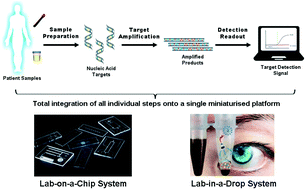Our official English website, www.x-mol.net, welcomes your
feedback! (Note: you will need to create a separate account there.)
Enabling miniaturised personalised diagnostics: from lab-on-a-chip to lab-in-a-drop
Lab on a Chip ( IF 6.1 ) Pub Date : 2017-08-16 00:00:00 , DOI: 10.1039/c7lc00587c Kevin M. Koo 1, 2, 3, 4, 5 , Eugene J. H. Wee 1, 2, 3, 4, 5 , Yuling Wang 1, 2, 3, 4, 5 , Matt Trau 1, 2, 3, 4, 5
Lab on a Chip ( IF 6.1 ) Pub Date : 2017-08-16 00:00:00 , DOI: 10.1039/c7lc00587c Kevin M. Koo 1, 2, 3, 4, 5 , Eugene J. H. Wee 1, 2, 3, 4, 5 , Yuling Wang 1, 2, 3, 4, 5 , Matt Trau 1, 2, 3, 4, 5
Affiliation

|
The concept of personalised diagnostics is to direct accurate clinical decisions based on an individual's unique disease molecular profile. Lab-on-a-chip (LOC) systems are prime personalised diagnostics examples which seek to perform an entire sample-to-outcome detection of disease nucleic acid (NA) biomarkers on a single miniaturised platform with minimal user handling. Despite the great potential of LOC devices in providing rapid, portable, and inexpensive personalised diagnosis at the point-of-care (POC), the translation of this technology into widespread use has still been hampered by the need for sophisticated and complex engineering. As an alternative miniaturised diagnostics platform free of precision fabrication, there have been recent developments towards a solution-based lab-in-a-drop (LID) system by which an entire laboratory-based diagnostics workflow could be downscaled and integrated within a singular fluid droplet for POC detection of NA biomarkers. In contrast to existing excellent reviews on miniaturised LOC fabrication and individual steps of NA biomarker sensing, we herein focus on miniaturised solution-based NA biosensing strategies suited for integrated LID personalised diagnostics development. In this review, we first evaluate the three fundamental bioassay steps for miniaturised NA biomarker detection: crude sample preparation, isothermal target amplification, and detection readout of amplicons. Then, we provide insights into research advancements towards a functional LID system which integrates all three of the above-mentioned fundamental steps. Finally, we discuss perspectives and future directions of LID diagnostic platforms in personalised medicine applications.
中文翻译:

支持小型化的个性化诊断:从芯片实验室到下拉实验室
个性化诊断的概念是根据个体独特的疾病分子概况指导准确的临床决策。芯片实验室(LOC)系统是主要的个性化诊断示例,旨在以最少的用户操作在单个小型平台上执行疾病核酸(NA)生物标志物的完整样本到结果检测。尽管LOC设备在提供即时,即时和廉价的个性化即时诊断(POC)方面具有巨大潜力,但由于需要复杂而复杂的工程技术,该技术无法实现广泛应用。作为无精密制造的替代性小型诊断平台,最近出现了一种基于解决方案的按需实验室(LID)系统的开发,通过该系统,可以缩小整个基于实验室的诊断工作流程的规模,并将其集成到用于对NA生物标记物进行POC检测的奇异液滴中。与现有的有关微型LOC制作和NA生物标志物传感的各个步骤的出色综述相反,我们在此集中于适用于集成LID个性化诊断开发的基于溶液的微型NA生物传感策略。在这篇综述中,我们首先评估了微型NA生物标志物检测的三个基本生物测定步骤:粗样品制备,等温靶标扩增和扩增子的检测读数。然后,我们提供了对功能LID系统的研究进展的见识,该系统集成了上述三个基本步骤。最后,我们讨论了个性化医学应用中LID诊断平台的观点和未来方向。
更新日期:2017-08-29
中文翻译:

支持小型化的个性化诊断:从芯片实验室到下拉实验室
个性化诊断的概念是根据个体独特的疾病分子概况指导准确的临床决策。芯片实验室(LOC)系统是主要的个性化诊断示例,旨在以最少的用户操作在单个小型平台上执行疾病核酸(NA)生物标志物的完整样本到结果检测。尽管LOC设备在提供即时,即时和廉价的个性化即时诊断(POC)方面具有巨大潜力,但由于需要复杂而复杂的工程技术,该技术无法实现广泛应用。作为无精密制造的替代性小型诊断平台,最近出现了一种基于解决方案的按需实验室(LID)系统的开发,通过该系统,可以缩小整个基于实验室的诊断工作流程的规模,并将其集成到用于对NA生物标记物进行POC检测的奇异液滴中。与现有的有关微型LOC制作和NA生物标志物传感的各个步骤的出色综述相反,我们在此集中于适用于集成LID个性化诊断开发的基于溶液的微型NA生物传感策略。在这篇综述中,我们首先评估了微型NA生物标志物检测的三个基本生物测定步骤:粗样品制备,等温靶标扩增和扩增子的检测读数。然后,我们提供了对功能LID系统的研究进展的见识,该系统集成了上述三个基本步骤。最后,我们讨论了个性化医学应用中LID诊断平台的观点和未来方向。











































 京公网安备 11010802027423号
京公网安备 11010802027423号